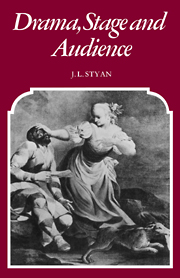4 - Conditions of performance
Published online by Cambridge University Press: 02 December 2009
Summary
This chapter returns to the notion of a play as an historical event. The discipline of studying a play is absolutely subject to understanding its original conditions of performance. The chorus of voices today should remind us that the student of drama has already moved away from the ‘new critical’ position which regarded a literary work as a self-contained artifact, to be satisfactorily understood and evaluated from its inner workings. The new critics have been of service in teaching us to eschew the impressionism and generalities of the belles lettrists, and to look closely at the way words interact to make their meaning and impact. Their emphasis on the intrinsic worth of literature was timely, and suited well with the needs of a modest verbal entity like a lyric poem. But the drama always resisted the idea of itself as an impersonal operation, having its existence in vacuo, and did not yield to a purely semantic analysis and the assumption of determined moral values. The inadequate operation of reading a play this way has shamefully limited our understanding of major dramatic fields like those of the Greek Old Comedy, Plautus and his street plays, medieval cycles, the Commedia dell'arte, the Restoration comedy and the Victorian domestic drama; no doubt other, more familiar, areas remain critically undernourished.
In Shakespeare's Plays in Performance, John Russell Brown reminds us that if you apply literary perceptions and values to the drama, and use specifically literary methods of criticism, you naturally enough arrive at literary judgments.
- Type
- Chapter
- Information
- Drama Stage and Audience , pp. 108 - 140Publisher: Cambridge University PressPrint publication year: 1975



